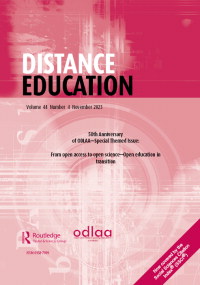需要改进的地方和内容?基于有效教学实践的MOOC评价框架设计与应用
IF 3.7
1区 教育学
Q1 EDUCATION & EDUCATIONAL RESEARCH
引用次数: 0
摘要
鉴于大规模在线开放课程(MOOC)的质量参差不齐,有必要构建MOOC评价框架来指导教师的在线教学实践。基于“质量问题”在线课程评价框架和对有效在线教学实践的研究,通过文献分析和专家访谈,构建了MOOC评价框架。最后,构建了包含8个维度、42个二级指标的评价框架。为了检验其有效性,我们使用该框架对5个mooc进行了评估。结果表明,该评价框架有助于mooc的评价,并为在线教师提供参考。它们揭示了mooc普遍存在的局限性:知识导入方法单一、评价方法传统、对学生主动性重视不足、对版权问题关注不足。为提高mooc的质量提出了相应的建议。讨论了改进mooc的理论和实践意义以及进一步研究的途径。本文章由计算机程序翻译,如有差异,请以英文原文为准。
Where and what to improve? Design and application of a MOOC evaluation framework based on effective teaching practices
Abstract Given the varied quality of massive open online courses (MOOCs), it is necessary to construct a MOOC evaluation framework to guide teachers’ online teaching practices. Based on the Quality Matters online course evaluation framework and studies on effective online teaching practices, a MOOC evaluation framework was constructed through literature analysis and expert interviews. Finally, an evaluation framework with eight dimensions and 42 secondary indicators was constructed. To examine its validity, five MOOCs were evaluated with this framework. Results show that the evaluation framework is helpful for evaluating MOOCs and providing implications for online instructors. They revealed the common limitations of MOOCs: single method for knowledge introduction, traditional evaluation methods, insufficient attention to student initiative, and inadequate copyright concerns. Corresponding suggestions are provided to improve the quality of MOOCs. Theoretical and practical implications for the improvement of MOOCs are discussed along with avenues for further research.
求助全文
通过发布文献求助,成功后即可免费获取论文全文。
去求助
来源期刊

Distance Education
EDUCATION & EDUCATIONAL RESEARCH-
CiteScore
10.70
自引率
6.80%
发文量
29
期刊介绍:
Distance Education, a peer-reviewed journal affiliated with the Open and Distance Learning Association of Australia, Inc., is dedicated to publishing research and scholarly content in the realm of open, distance, and flexible education. Focusing on the freedom of learners from constraints in time, pace, and place of study, the journal has been a pioneering source in these educational domains. It continues to contribute original and scholarly work, playing a crucial role in advancing knowledge and practice in open and distance learning.
 求助内容:
求助内容: 应助结果提醒方式:
应助结果提醒方式:


